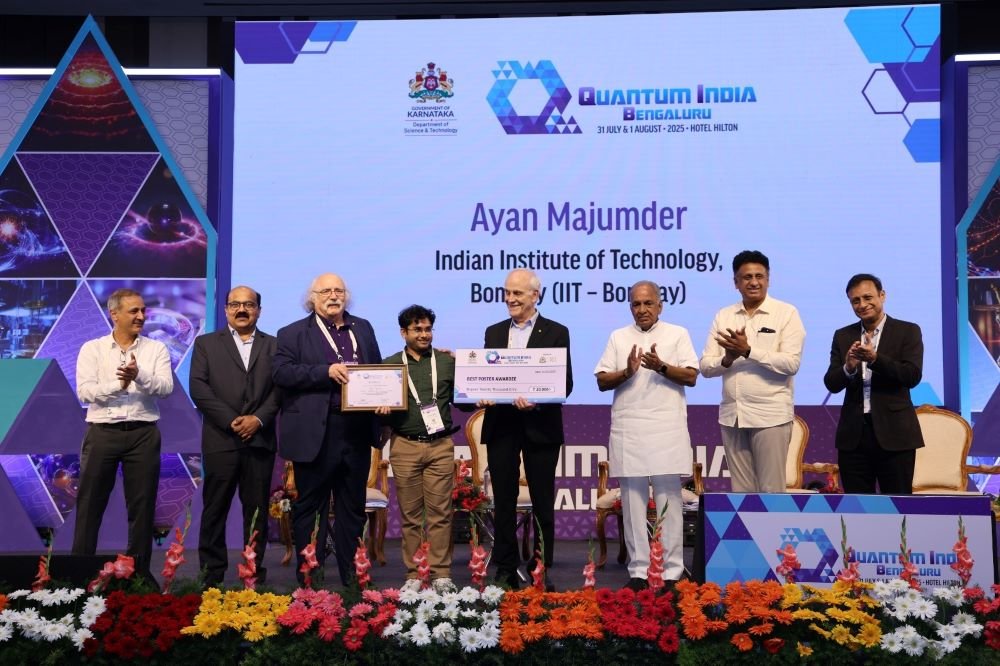Quantum India Bengaluru 2025 attracts 1000+ delegates
August 06, 2025 | Wednesday | News
Two-day summit started on July 31 featured over 25 sessions across five core tracks
The inaugural edition of Quantum India Bengaluru (QIB) 2025, organised by the Karnataka Science and Technology Promotion Society (KSTePS) and the Department of Science and Technology, Government of Karnataka, in collaboration with the IISc Quantum Technology Initiative (IQTI), on the theme “Building a Quantum Ecosystem: Qubits to Society,” facilitated 74 B2B meetings welcomed over 1951 attendees, including 1,000+ registered delegates, 75 speakers, 37 exhibitors, and participants from more than 19 countries, alongside senior representatives from academia, industry, and government.
The two-day summit started on July 31 featured over 25 sessions across five core tracks—Quantum Computing; Finance & AI; Healthcare & Security; Peripherals & Hardware; and Society & Art—illustrating the breadth of quantum applications.
Keynotes by Nobel Laureates Prof. Duncan Haldane and Prof. David Gross set the tone for the event, complemented by a special plenary address by Prof. Tommaso Calarco, European Union Quantum Flagship and the Institute of Quantum Control, PGI-8, Germany. The agenda included focused panels on India’s quantum roadmap, global collaboration, academic research, industry integration, and public engagement, showcasing how India is shaping a cohesive quantum ecosystem.
Throughout the summit, transformative ideas, indigenous innovations, and academic-industry partnerships came to life through a curated exhibition that offered attendees a first-hand look at Karnataka’s and India’s quantum innovation landscape. With participation from over 20 academic institutions, deep-tech startups, and research labs, the exhibition showcased emerging technologies in quantum computing, novel materials, secure communication, cryptographic protocols, and quantum sensing.
Quantum in Healthcare featured cutting-edge applications across diagnostics and life sciences. On the first day, Prof. Varun Raghunathan, IISc Bengaluru presented on Towards Quantum Enhanced Nonlinear Optical Microscopy. Dr. Anupama Ray of IBM discussed Quantum Machine Learning for Healthcare. Prof. Songi Han from Northwestern University, USA, spoke on Triplet Spin State Dependent Signal Transduction in Light-Oxygen-Voltage Sensitive Receptors. Dr. Pranab Dutta of GDQ Labs shared his work on Transforming Cardiac Care with Quantum Precision. These sessions emphasized quantum’s real-world impact in clinical innovation.
On the second day, the session on healthcare segment began with Prof. Kasturi Saha, IIT Bombay, who showcased the use of NV centres in nanodiamonds for real-time, non-invasive sensing of reactive oxygen species (ROS) in brain cancer cells, enabling precise monitoring of drug efficacy and laying the foundation for advanced quantum diagnostics. She also introduced early research on a quantum diamond microscope for high-resolution brain imaging.
This was followed by a panel moderated by Dr. Shesha Raghunathan, IBM, featuring Prof. Vijay Chandru, Strand Life Sciences, Prof. Deepak Kumar Saini, IISc, Bengaluru, Prof. Songi Han, Northwestern University, USA, Sohil Bhagat, pi Ventures, and Dr Pranab Dutta, GDQ Labs, among others. The discussion spanned quantum-enabled diagnostics, personalised medicine, real-time monitoring, and investor outlooks—reinforcing India’s potential to lead in accessible, next-generation quantum healthcare solutions.
A dedicated Poster Showcase, inaugurated alongside the exhibition, featured more than 41 research posters from scholars and doctoral researchers, providing diverse perspectives in areas such as quantum algorithms, hardware, and cryptography. Outstanding entries from the showcase were formally awarded during the valedictory session. Winners of the poster awards, each receiving a prize of Rs 20,000, include: Shuvarati Roy, Indian Institute of Science Education and Research, Pune; Kanad Sengupta, Indian Institute of Science, Bengaluru; Ayan Majumder, Indian Institute of Technology, Bombay; Purna Pal, Indian Institute of Science, Bengaluru.









